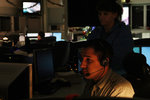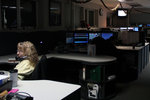

The holiday season may have come to a close, but tinsel was still hanging from the ceiling and lights were still blinking on a Christmas tree Thursday as 911 dispatchers spent the first day of 2015 answering phones and toning out aid.
Adrenaline levels in the room rose and fell as calls ranging from a non-injury rollover to a pursuit at Walmart (see Sirens in today’s paper) came into the Lewis County 911 Communications Center Thursday night.
Jerrie Oconner was finishing out a 14-hour shift that evening, but despite the sometimes long days and holiday work, she’s been a dispatcher for 18 years. She said many of her coworkers also have long tenures.
For the first year she worked as a dispatcher she said she was looking for a different line of work because she had a hard time with taking incidents personally and sometimes feeling like she should have done more to help someone.
But it’s the times that someone is helped and the outcome of a call is good that make the unpredictable and stressful job worth doing.
“You never know what you’ll get when you answer the phone,” she said.
Conversations between The Chronicle reporter and on-duty dispatchers were sporadically interrupted by calls, which sent employees swiveling in their office chairs back to their stations, which each include four computer monitors.
“911, what’s your emergency?” Davene Rodocker, supervisor, said when she answered a call.
She continued asking questions finding out if anyone is injured, where the caller was, what help was needed and other details about the situation.
When James Hatchett, who began working at the center in July 2014, was asked what he likes about the job he said, “Tons, but I have to tone out a call right now.”
After notifying the necessary fire district, he said the best part of the job is that he gets to help people in need.
When new dispatchers begin on the job, one of the first things Rodocker, who has been a dispatcher for 23 years, suggests they do is learn the geographic area of the county, which has many different features can lead to a variety of incidents.
The dispatchers handle calls for crimes against people and property as well as home, commercial and outdoor fires, accidents on city, county and state roads, medical aid and assistance in missing people cases and rescues in forests, on mountains and in rivers and lakes. The dispatchers run plates and do background checks on people involved in incidents so officers know if a safety risk is possible when they arrive on scene. They also help with non-emergency calls involving towing companies, public works and alarm companies. Then there’s pranksters, misdials and pocket dials that tie up lines and prevent telecommunications officers from helping those in need.
In the midst of those phone calls and the information dispatchers process and disperse, there are emotional challenges such as not having closure on incidents and working with suicidal and mental health issue callers, Rodocker said.
“What’s a huge emotional impact is we might be the last voice they hear,” Rodocker said.
She said the dispatchers of Lewis County are some of the most compassionate and patient people she knows.
Rodocker said when she first started dispatchers were told to “suck it up,” but that attitude has changed to one of support and talking about difficult calls.
“It’s human to cry,” she said.
Along with emotional incidents, dispatchers also sometimes deal with being blamed for problems because they are the first people contacted.
“We’re receiving information on the radio or telephone and only relay what we’re told,” Rodocker said.
Being recognized as an important part of the team of emergency responders and police has also improved since Rodocker began her job. She said they’ve received flowers, gift baskets and thank you notes from callers as well as responders.
But it’s not the public or the fire and law personnel they work with who offer the most support. The dispatchers at the center are one another’s biggest cheerleaders when challenging and sometimes heartbreaking calls come through.
“I’m so proud of the people I work with,” Rodocker said.